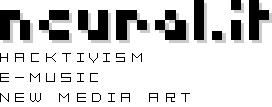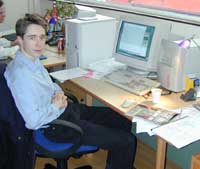




Ian Clarke interview.
by Alessandro Ludovico
Anonimity is a very hot topic for communication networks, both in identity and contents, but it's often misunderstood or even ignored. Why people don't feel the urge for seriously protecting their own privacy?
Because generally people don't really suffer directly from losing their anonymity, and most people feel that they have nothing to hide. It is similar to a question of freedom of speech, people may not have anything specific to say in criticism of their government, but they should still have the right to criticise their government without punishment.
You said that on Freenet "information can be shared without fear of censorship". What's in your opinion the worst digital project (legal or technical, yet realized or in development) censoring free information?
I would say that it is the "Digital Millenium Copyright Act" or DMCA in the US.
One of most famous cyberpunk slogans was 'Information wants to be free'. Is it still true?
I think that it is getting more and more difficult to prevent people from communicating as technology improves, because of this I think that you could say "Information wants to be free".
Could the current software/hardware architecture fight (peer-to-peer VS. client/server) be compared to a sort of 'user liberation front' battle? Will the user itself be really free with p2p schemes, in a way that will make the word 'user' (opposed to someone else that produces software or content) senseless?
I don't really think in terms of "peer to peer" since most systems described as p2p have little or nothing in common (eg. Napster and Freenet). I think that if there is a fight it is between users who want to use the Internet interactively, and big companies who would like to turn the Internet into another broadcast medium.
The information's nomad path is proabably one of the most fascinating characteristic of the net. But it's also such a new concept for our culture, trascending the 'possession' of physical objects and goods. Do you think people fear this kind of processes, just because they're not yet culturally used to them?
I don't think that it is a new idea at all - the concept that information is property has only really existed for the last 30 years or so. I think that it is unnatural to think of information as property, and I recall that the first time I heard of copyright as a child I was quite surprised by the concept.
Do you remember when this happened and what was copyrighted?
I had written a piece of software for a science competition in Dublin when I was about 13, and someone told me I should copyright it. I found it difficult to believe that just by placing some words in my computer program, that suddenly nobody else could use or copy it without my permission.
Do you feel the DNS structure as a tool for controlling people's access to contents? What do you think of the Name.Space project (an alternative DNS scheme), developed by Paul Garrin in the middle-nineties and now abandoned?
I am not familiar with Name.Space. I think that DNS is a bad design in that it imposed centralization on a system which should be completely decentralized.
Which are, in your opinion, the real reasons for the Napster's world-wide success?
People like free music.
Musical tracks are one of the most exchanged data on the Internet. Why? Just for the relatively high content/amount of data rate, or for more instrinsic reasons?
Humans like music, the Internet is now fast enough that music can be exchanged conveniently.
Would you like to be part of the ICANN board? If you'd be there with no pressure, what should be your first public act?
I don't think politics is the answer to the Internet's problems, that is why I created Freenet.
What you think of other peer-to-peer architectures like Gnutella, becoming more and more popular, or the monstrous OceanStore project funded by University of California/The Defense Research?
I don't think that Gnutella is very well designed, it isn't scalable. OceanStore is interesting, but Freenet achieves everything that OceanStore seems to achieve, and more, and Freenet already has working software (OceanStore is still in its design stages).
When you start working with Freenet? Which are the Freenet development's future plans? Do you need any human/technical help to reach them?
I started working on the Freenet design around the Summer of 1998, and finished the basic design around July 1999. I have been working with a number of volunteers around the world to write the actual software, we released version 0.1 in March 2000, and will shortly be releasing version 0.3.7. For the future we want to make it easier to use, more secure, and faster.
February, 2001.